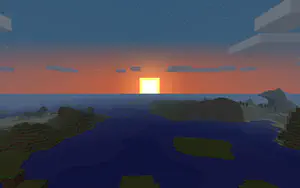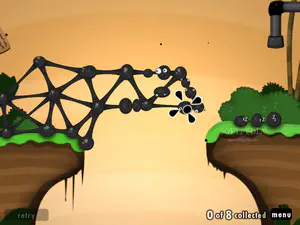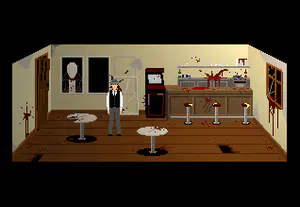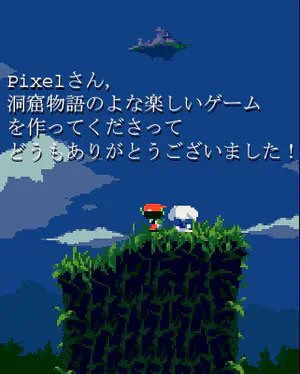The past year has witnessed some of the biggest, most expensive videogames ever created, including Gran Turismo 5’s massive $80M budget and Starcraft II’s even more enormous $100M cost. 2011 looks to offer more of the same overwhelmingly high-budget titles. Here’s a chance to get a glimpse of the much less expensive, oft overlooked world of indie gaming. It’s been picking up a lot of speed lately, largely thanks to efforts by major digital distributors in offering venues for indie developers to showcase their games. The proliferation of casual gaming has only served to boost interest in small-scale development as well. Games like these tend to adhere to the values of simplicity, challenge, and/or wit to deliver a gaming experience on par with (or in some cases, exceeding) even the AAA blockbusters that eclipse them.
Minecraft #

If you haven’t yet heard of Minecraft, you need to visit more videogame sites. This is possibly the indie game that has produced the most noise of them all, in terms of publicity through blogs, trackbacks, and word of mouth. The popular explanation of Minecraft is LEGO with monsters, where you mine blocks and craft them into tools. Of course, this description does little to explain the technical masterpiece.
To get in-depth, imagine a world made entirely out of cube blocks. It doesn’t matter how you imagine it; every world is randomly and procedurally generated, so no two playthroughs are alike. Trees, leaves, mountains, water, even the animals and monsters that inhabit it are made of these blocks. And every single one of these blocks can be manipulated – destroyed, gathered, refined into other items, or replaced into the world – by you.
World of Goo #

Creating a game that everyone enjoys is difficult enough. Creating a game that everyone enjoys, that wins numerous indie game awards, that gets noticed and published by Nintendo, and that is entirely about droplets of goo is a totally different beast. The premise is to guide these sentient goo balls (that look like creatures straight out of Spirited Away) into pipelines that lead to the next level, by organizing them into structures – bridges, towers, scaffolding – that conform to simplified laws of physics.
Developed by two ex-EA employees, had a rocky start. Kyle Gabler, fresh out of college, had a student loan of $60,000 to take care of. He and his partner, Ron Carmel, worked on the game entirely out of free Wi-Fi-enabled coffee shops. The budget for their work was also their living expenses. Yet, despite their financial woes, they remained “stupidly optimistic,” and World of Goo was the result.
Mount & Blade #
There are some things that come naturally to married couples. Finishing each others’ sentences, sharing food and feeding each other, and raising kids all come to mind. It would be rude to call whatever spurred Armağan Yavuz, founder of TaleWorlds, and his wife, İpek Yavuz to create a videogame together as “unnatural,” but it certainly is delightfully rare.
Mount & Blade – and its sequel, Mount & Blade: Warband – is, in as few words as possible, a medieval combat simulator. Fans of the game praise its combat mechanics, which go beyond the normal “press A to swing horizontally, B to swing vertically” trend. Using mouse gestures and timed clicking to deliver lethal blows is strangely satisfying and refreshing.
Warband expands on the original’s singleplayer campaign with enhanced AI, an additional faction, and online multiplayer modes.
Rhythm Zone #
Have you ever wanted to play Rock Band or Guitar Hero to songs like Harana, Tadhana, or Yugto? Maybe you’re a closet Glee fan (can’t say Gleek, it’s trademarked – wait, does that count?) and would love to play their renditions of Poison, Physical, or Toxic? For whatever reason, maybe the song you wanted to perform isn’t on one of these popular rhythm games. Well, you can’t always get what you want, but don’t stop believing, because the dog days are over.
Rhythm Zone, developed by indie company Sonic Boom Games – who also made other games you’ve probably never heard of such as Redneck Racing and Alice in Bomberland – allows you to load up your own personal music collection and tap to their unique beats. While it isn’t perfect (sometimes the note choices seem too random), Sonic Boom deserves credit for taking an obvious idea and going with it.
The Chzo Mythos #

You may know Ben “Yahtzee” Croshaw from his popular videogame review series “Zero Punctuation,” where he spews out line after line of criticism with nary a pause between words. As if that, and his trilby hat, doesn’t make him awesome enough, Yahtzee also wrote his own videogames once upon a time.
The Chzo Mythos is the collective name of four suspense/horror adventure games Yahtzee made between 2003 and 2007. They are, in order of plot, 5 Days a Stranger, Trilby’s Notes, 6 Days a Sacrifice, and 7 Days a Skeptic. Anybody with a Lovecraft bone in their body will take to these games, as there are elements similar to the Cthulu Mythos.
Yahtzee has won many AGS awards for these games, including but not limited to Best Story, Best Scripting, Best Dialogue, and of course, Best Game. The series is available for free on his website.
Dokutsu Monogatari (Cave Story) #

What have you done during your breaks lately? Daisuke Amaya, known as Pixel, made one of the most beloved indie games on the Internet in over five years worth of free time. Since its release in 2004 it has slowly gained popularity, until finally reaching Nintendo who published it on their WiiWare service in 2010. It’s a platform adventure game with elements from Metroid and Castlevania, yet its size and scope dwarfs both.
Critically acclaimed for its compelling story and smooth, simple gameplay which – reminiscent of the classics – teaches without the need for tutorials, Cave Story is an excellent example of how a dedicated, passionate, and talented individual can still create a game that can stand beside giants. The game is available for free on the PC, and for 1200 Points ($12) on the WiiWare service.